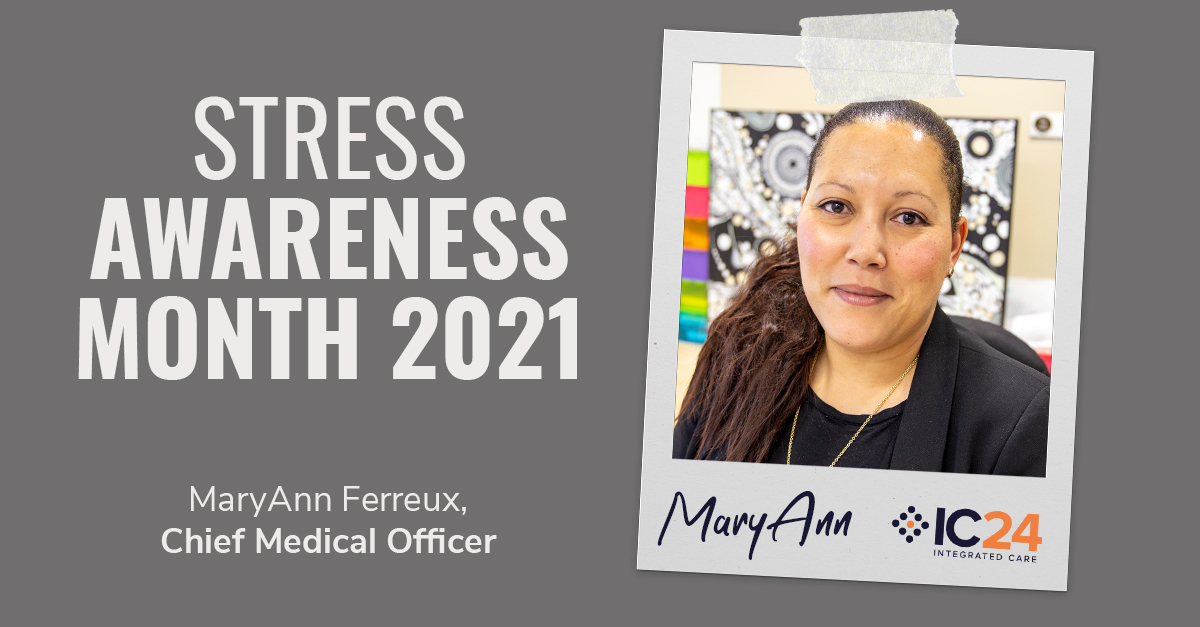Stress Awareness Month 2021
We all get stressed, it’s part and parcel of life, but there’s a lot we can do to prevent it. For Stress Awareness Month, our Chief Medical Officer, MaryAnn Ferreux, gives us some top tips for reducing stress and how to identify, assess and act.
by MaryAnn Ferreux - Chief Medical Officer

Stress Awareness Month 2021 - MaryAnn Ferreux
We all get stressed, it’s part and parcel of life, but there’s a lot we can do to prevent it. For Stress Awareness Month, our Chief Medical Officer, MaryAnn Ferreux, gives us some top tips for reducing stress and how to identify, assess and act.
What is Stress Awareness Month?
Stress is one of the greatest public health challenges of our time. Each year, Stress Awareness Month invites the nation to come together to raise better public awareness about both the causes and cures of the modern stress epidemic. 2020 and 2021 have been particularly stressful, so this year's event may be more important than ever.
Recognising warning signs
We all experience stress differently. Sometimes you're able to tell right away when you're feeling under pressure, and other times you carry on without recognising the warning signs.
Stress is your body's way of responding to any kind of demand or threat. Sometimes stress can help you to stay focused, energetic, and alert. But if you find yourself feeling frequently overwhelmed, it's time to act, as you could be experiencing a variety of chronic stress symptoms including irritability, anxiety, depression, or insomnia. If you believe you’re experiencing some of these symptoms, then please make time to book an appointment with your GP to discuss your situation and complete a wellness and mental health check.
Identifying causes
Your phone is ringing off the hook and your emails are overflowing; these are both examples of acute stress - and they're short-term. However, if you're feeling overwhelmed every day, you may be experiencing long-term stress. Long-term stressors can range from work issues, money problems, relationships, or significant life changes. But smaller things, like daily job stresses can add up too. Learning how to recognise the various sources of stress in your life is the first step to managing them.
How stress affects your body
If you’ve ever experienced stress before, you’ll know that being under pressure can have an immediate effect on your body, like muscle tightness, headaches, and overeating. These symptoms are merely signalling the deeper impacts that long-term stress can have on your entire body, from your central nervous system to your digestive and immune systems.
Our nervous system is a control system that’s responsible for regulating all our unconscious bodily functions including heart rate, digestion and breathing. It’s also in charge of your physical response to stress and generates a ‘fight or flight’ response. This triggers your brain to tell your adrenal glands to release stress hormones, like adrenaline and cortisol. These hormones send blood rushing to areas that are needed most in an emergency, as well as increasing your heartbeat. When the acute stress has passed, your body will return to its normal state, but, if you’re experiencing chronic stress you can continue to have an ongoing, increased heart rate, which can lead to long-term heart or blood vessel problems. Stress that's left unchecked can contribute to many health problems, such as high blood pressure, heart disease, obesity and diabetes.
Making time for you
Stressful events are a part of life, and whilst you may not be able to change your current situation, you can take steps to manage the impact these events have on your wellbeing.
Regardless of how many demands you have on your plate, one thing is certain, if you overdo things on a regular basis, you run the risk of burning out. Taking time out to relax is essential for your wellbeing. Making 'me time' a priority can reduce stress levels and help you to feel refreshed. Here's a couple of ideas for your 'me time': taking a nap; doing something active; pampering yourself or trying a new hobby.
Whatever you decide to do, try to do it fully and completely. So, if you go for a walk, try not to take your phone. Just concentrate on the task at hand, and take in the sights, smells, and sounds around you.
As famously written by Lori Deschene, you don't have to be positive all the time, and it's perfectly ok to feel sad, angry, and annoyed. Having feelings doesn't make you a negative person, it makes you human.
Further advice and support
If you’re looking for additional support, then please see the list of resources below:
NHS UK
MIND
International Stress Management Association